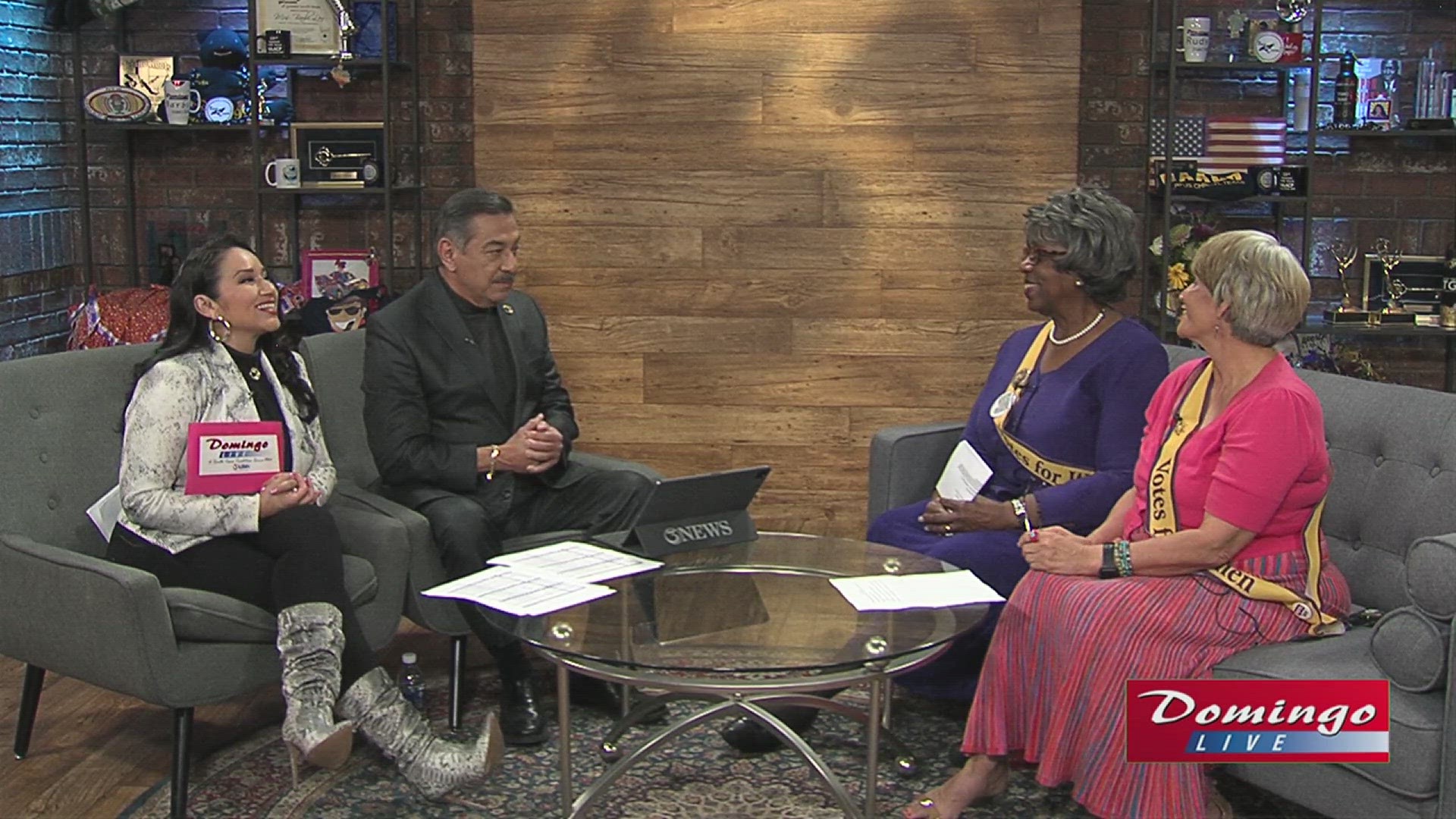3News has partnered with the League of Women Voters, a non-profit and non-partisan organization dedicated to voter education, to help make sure the community has access to all the information they need before hitting the polls Nov. 3.
The following information was gathered and compiled by the League and published in their Voters Guide and on Vote411.org.
Texas District Courts are the trial courts of general jurisdiction in Texas. "The geographical area served by each court is established by the Legislature, but each county must be served by at least one district court. In sparsely populated areas of the State, several counties may be served by a single district court, while an urban county may be served by many district courts."[1] The district courts often have concurrent jurisdiction with the Texas county courts.
As of September 2013, there are 448 district courts in Texas. District courts have one judge per court.
District courts have original jurisdiction in all felony criminal cases, divorce cases, cases involving title to land, election contest cases, civil matters in which the amount in controversy (the amount of money or damages involved) is $200 or more, and any matters in which jurisdiction is not placed in another trial court. While most district courts try both criminal and civil cases, in the more densely populated counties the courts may specialize in civil, criminal, juvenile, or family law matters."
Nanette Hasette, Incumbent (Democrat)
BACKGROUND: Describe your strongest competency and life experience that qualify you to hold this office.
I am experienced and I have been licensed to practice law for over 30 years. In addition, I have had the great honor of serving you as the 28th District Court judge for 24 years, making decisions in criminal, civil, and family law cases every single day. These experiences have given me the wisdom and expertise needed to render fair, balanced, and law-based decisions.
ISSUES: What are the most pressing problems facing the District Courts, and how do you propose handling these issues?
The most pressing problem facing all Texas courts is conducting judicial proceedings during the current pandemic while providing a safe environment for all involved. The ever-changing developments of Covid-19 and local outbreaks present a challenge, but I believe our robust preparation plan with its stringent requirements approved by local health departments will protect our citizens and our constitutional rights.
JUDICIAL SELECTION: Texas is one of the few states that elect judges. What changes in the judicial selection process, if any, would you recommend?
I would not recommend any changes in the judicial selection process. The appointment process has historically resulted in denying minorities and women access to judicial positions. The right to elect judges should continue to be done by the electorate and not be diluted by politicians in Austin. The right to vote is the most precious individual right we have to elect our leaders and judges and therefore should be protected.
VIRTUAL TRIALS: The use of virtual trials during the current COVID-19 pandemic will change permanently how the judicial system operates.
Strongly disagree
Disagree
Neither agree nor disagree
Agree
Strongly agree
Please explain your answer.
The justice system is essential to the people. When unforeseen circumstances arise, courts must be innovative to ensure our justice system continues. Virtual court proceedings have provided the means to continue operating during these unprecedented times. I believe it has improved some aspects of court such as hearings or bench trials but there are some disadvantages. My hope is that Covid-19 will no longer be a threat and we can return to normal court proceedings and use virtual ones as needed.
VIRTUAL TRIALS: With the use of virtual trials on the rise due to the COVID-19 pandemic, what measures should be in place to protect the well-being of and guarantee access for individuals who are disabled, indigent and compromised because of physical or mental health issues?
Nueces County Judges have spent countless hours creating procedures to protect the public. We have taken protective measures by conducting virtual hearings, social distancing in shared spaces, wearing masks, using plexiglass installations, and regular sanitizing. We also provide laptops and internet access if needed for those who are unable to come to court, as well as sign or language interpreters. There should be no economic barrier or disability preventing anyone from accessing the courts.
Greg Perkes (Republican)
Campaign Email http://GrGregPerkesCampaign@Yahoo.Com
Campaign Phone Number (361) 813-8003
Website http://www.electgregperkes.com
Facebook http://Elect Greg Perkes
Twitter @GregPerkes
BACKGROUND: Describe your strongest competency and life experience that qualify you to hold this office.
Highlights of my professional career include 33-plus years experience as a trial and appellate attorney; more than 2 decades board certification in civil appellate law; almost 8 years as a Justice on the 13th Court of Appeals; Judge Paul Nye Professionalism Award, admission to practice before the U.S. Supreme Court; and certified mediator in Texas. My experience, mediation skills, and hard work ethic will benefit the District Court and the people it serves.
ISSUES: What are the most pressing problems facing the District Courts, and how do you propose handling these issues?
- Access to Justice: Videoconferencing should be used to streamline indigent defense processes. This technology provides the opportunity to improve coordination and timeliness of the indigent defense system, and helps assure the system meets the requirements of law.
- Timeliness: District Courts have a backlog of cases - translates into delay. I was the most productive appellate justice (case volume) this past year. I would apply my work ethics and skills to reduce the size of the docket.
JUDICIAL SELECTION: Texas is one of the few states that elect judges. What changes in the judicial selection process, if any, would you recommend?
I would recommend changing the current system to an appointment system with the judge being presented for an affirmation vote every four years. Too many experienced judges are lost during the expensive political season. Also, minimum qualifications should be created showing that the person has the necessary skills to be a judge; ie. board certification.
VIRTUAL TRIALS: The use of virtual trials during the current COVID-19 pandemic will change permanently how the judicial system operates.
Strongly disagree
Disagree
Neither agree nor disagree
Agree
Strongly agree
Please explain your answer.
Virtual trials can work but have been limited in Texas by the Texas Supreme Court. General hearings and consensual bench (non-jury) trials have seen the most success across the country but jury trials have raised many issues including the Confrontation Clause of the United States Constitution. Judicial efficiency and increased access to justice are just two of its benefits.
VIRTUAL TRIALS: With the use of virtual trials on the rise due to the COVID-19 pandemic, what measures should be in place to protect the well-being of and guarantee access for individuals who are disabled, indigent and compromised because of physical or mental health issues?
I’m proud of the justice system. Centers are being established which provides meaningful access to equipment and facilities that best meet the needs of the individual. In view of the pandemic, continuing consideration should be given to face coverings, social distancing, equipment cleaning and courtroom arrangement when present at the courthouse. A Judge’s greatest responsibility is ensuring equal and timely access to justice, and I take this responsibility seriously.
The above information was gathered and compiled by the League of Women Voters, a non-profit and non-partisan organization dedicated to voter education.
3News has partnered with the League in order to help make sure our community has access to all the information they need before they hit the polls. You can find more of this information at Vote411.org.



